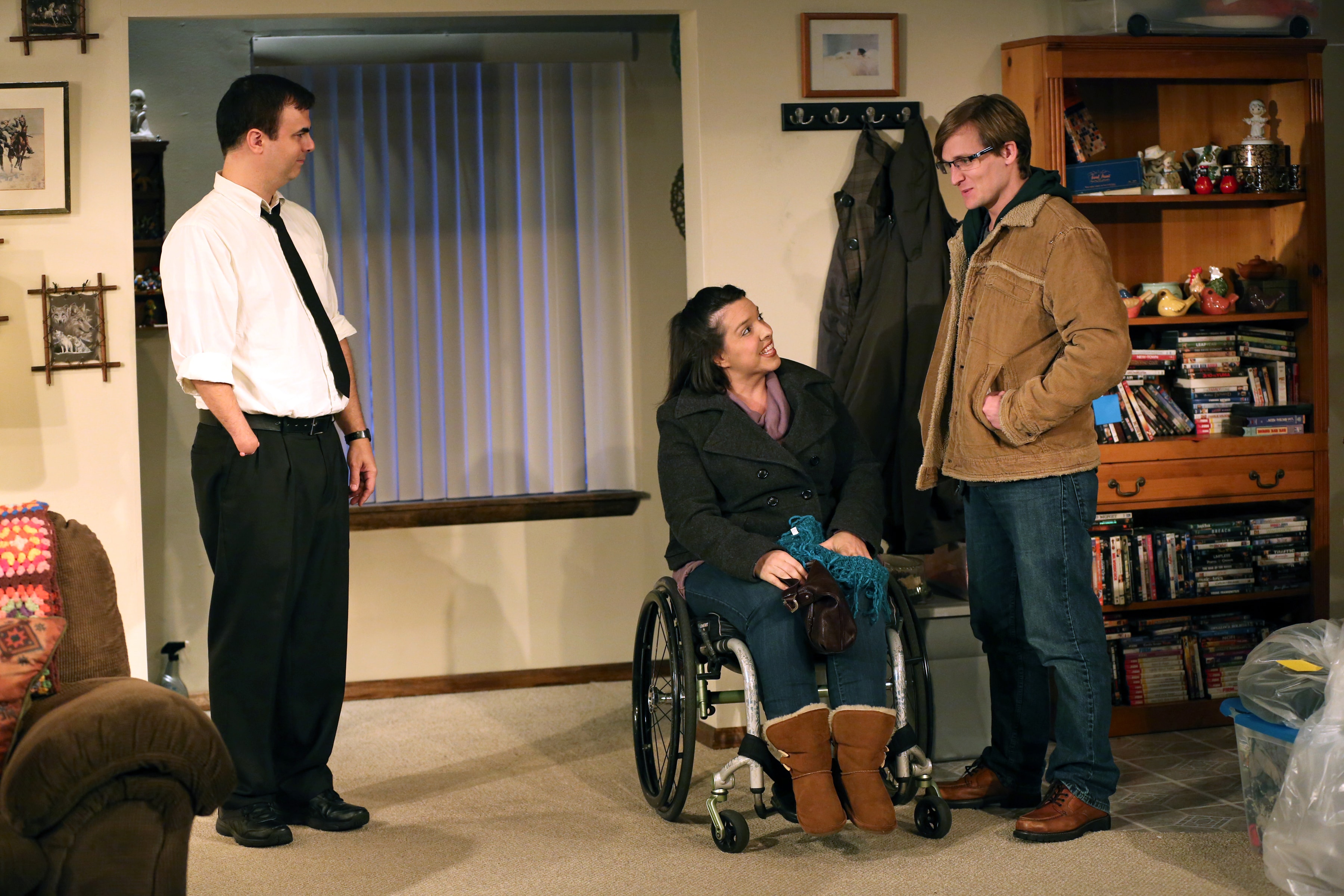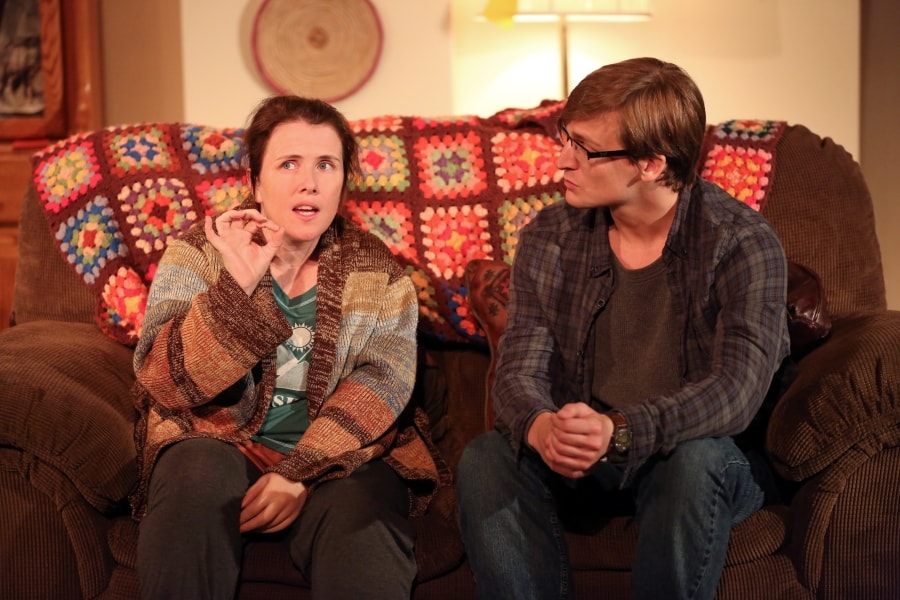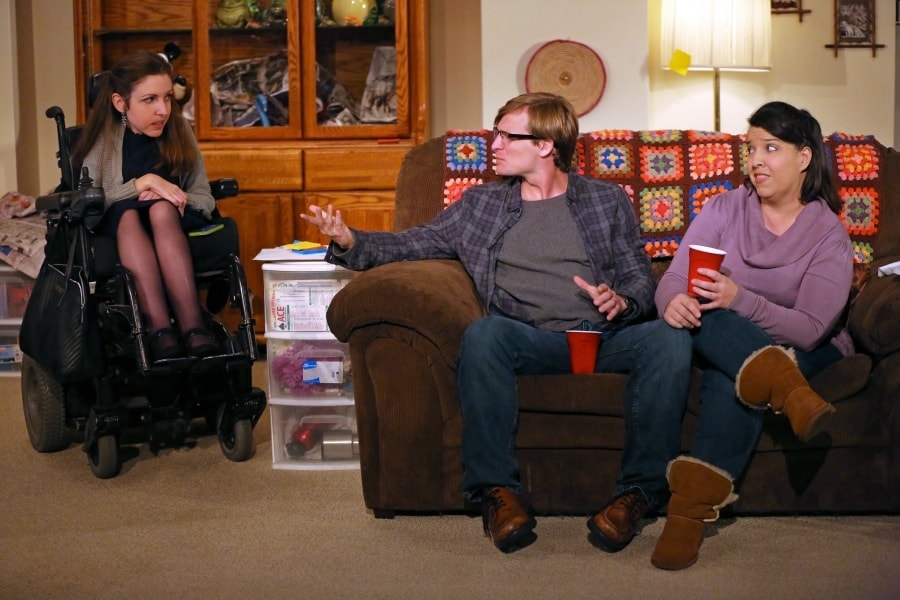Samuel D. Hunter’s The Healing opens with a group of friends sorting through their late friend Zoe’s assets after her funeral. The friends are packing up boxes of tchotchkes and miniature figurines, and anger and confusion abound as some of them learn for the first time that Zoe took her own life after years of battling depression with the faith that prayer would heal her from her illness.
Then, in true Hunter fashion, the character of Donald, played by David Harrell, breaks the tension. “This is terrible to ask and I hate myself for even thinking it,” he begins. “But do you think I could take the riding lawn mower?”
The playwright’s ability to weave humor into the gravest situations is put to use in The Healing, produced by Theater Breaking Through Barriers (TBTB) at Theatre Row’s Clurman Theatre through July 16. The play takes place in rural Idaho, where Hunter is from and where many of his plays are set, but the heady topics of morality and religion are paired with a new factor: The characters must be portrayed by performers with disabilities and Deaf actors.
The play is Hunter’s fourth project with the company; he wrote three short plays for their annual festival. But The Healing marks his first full-length endeavor. When TBTB commissioned Hunter in 2014, he wanted to take the opportunity to write a play that wasn’t about the disabled experience, which had been the focus of his work for the short-play festivals. While disability is a part of both the characters’ and the actors’ experiences, The Healing is ultimately about the power of friendship and morality.
“I am much more interested in writing something that is not ostensibly about disability, but just something where it factors into the characters and their daily lives,” says Hunter. “That is the place where The Healing was written from—a place of not wanting to ignore the fact that some of these people have disabilities, but also not wanting to make a play that is a topical exploration of disability in America.”
When the late Ike Schambelan, founding artistic director of TBTB, first reached out to Hunter to write a 10-minute play for the company in 2012, Hunter checked out the online acting reels of the company members and came across a standup comedy video featuring Shannon DeVido. “I thought she was really great and magnetic, so I ended up writing a 10-minute play for her and David Harrell,” said Hunter. The comic play, Welcome to Walmart, featured DeVido and Harrell as Walmart greeters.

Harrell and DeVido, who both star in The Healing, were instrumental in the play’s development process, which started two years ago. “Any time you are writing out of the realm of experience—which is, for most writers, most of the time—you just need to be concerned with authenticity and making sure that you are not telling somebody else’s story in a way that doesn’t make sense to them,” explains Hunter.
Being a part of the development process of a new play was a first for DeVido, and she enjoyed watching Hunter work. They were also both on the same page about the play not focusing on disability. “I don’t want to overcome anything,” says DeVido, who uses a wheelchair. “I don’t want it to do with a disabled trope that we all tend to see.”
DeVido’s own experiences inspired some of the story for The Healing. She told Hunter about the time when a person approached her in a mall food court in Tennessee and said, “Ma’am, I know that your life is awful right now, but when you die soon, you’ll be seated at the right hand of God.” The story, which is also a bit in DeVido’s standup routine, stayed with Hunter. “What struck me about it is that it’s so utterly misguided but also just so oddly compassionate,” says Hunter. “It is coming from a really misguided sense of compassion and empathy.”
Brainstorming sessions for the play also led to topics of Christian Science, whose adherents believe illness and sin can be overcome by prayer alone. The Healing is about five childhood friends who attended a sleepaway camp led by a Christian Scientist, who form friendships based on the fact that each of them has a different disability.
DeVido and Harrell’s characters were both written with them in mind; after the other parts were cast, Hunter tailored the script to fit the actors too. For example, the character of Greg, played by John McGinty, was originally not conceived as a Deaf character, but since McGinty is Deaf, the character became Deaf as well. Not all of the characters are written to have disabilities, but Hunter has made clear that in future productions the characters should be portrayed by performers with disabilities and Deaf actors, with the proviso that theatres can revise the script to fit the different disabilities of actors cast.

The disabilites of the main characters are written pretty integrally into the script. Sharon, played by DeVido, is written to use a wheelchair, and there is a conversation in the play about needing an aide to accompany her on her trip to the out-of-state funeral. Bonnie, played by Jamie Petrone, is also written to use a wheelchair; she comments that a fellow airplane passenger complimented her for her bravery—another example of misguided empathy. The character of Greg is written as Deaf, a characteristic Hunter would like to see upheld in future productions.
But there are no specifications for other characters, leaving casting opportunities open for future productions of the play. “The very basic reason I think TBTB exists—and by extension the reason this play exists—is to give opportunities to these really great actors,” says Hunter. “So I wanted to make this play as open as possible.”
The cast’s sense of humor about disability, which comes through in the play, was also crucial to the play’s development. McGinty led Hunter and the cast through ways he would navigate certain situations in real life, and his personal stories resulted in playful exchanges between his character and Laura, played by Mary Theresa Archibold, who attempts to communicate with him via gestures throughout the play—including a signed version of TLC’s “Waterfalls,” her only knowledge of American Sign Language. In other scenes, Greg’s girlfriend Bonnie translates ASL for the friends.
Still, that some of the actors use wheelchairs to get from stage right to stage left is ultimately secondary to the play’s story of friendship and loss.
“I will be interested to see how some people will interact with it,” says Hunter. “I am sure there will be some people who will be frustrated that the play is not a topical play about disability,. I’ve encountered that with other plays that I have written, where there is a way to write the play that is issue-driven. But I’ve never written an issue-driven play, and that frustrates some people.”
If such expectations are a barrier, that’s another one broken.


